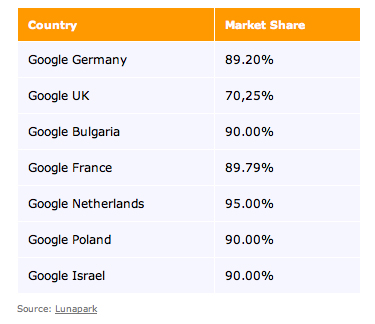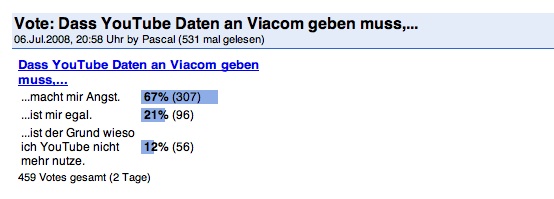“Google has to forward YouTube-Userdata” title of AFP article
“YouTube-Userdata: Datatrap USA” was the title on ORF.at
“In the Datatrap with YouTube” published in “Stern”
“YouTube-Users are becoming transparent” was written by the Financial Times Germany
“Verdict depicts YouTube as Datamonster” titled the “Spiegel”
There are hundreds of examples of other news-portals that deal with the problems I warned about in my book “The Google-Trap” – nonetheless, it was waved aside as a “conspiracy” and “scare tactics” by naïve and blinded members of the Internet scene. I had anticipated this development after my discerning look behind the scenes of the corporation.
Google has to deliver data that it collects to a different Company. A New York district court has ruled that all YouTube user data must be forwarded to the media-giant Viacom. The corporation, which also owns the music-station MTV, indicted Google for many cases of copyright infringement. It claimed indemnification worth 750 million euros. The court made the verdict on Tuesday - details can be read here.
The complete user log of YouTube – containing more than 12 Terabyte of data – has to be forwarded to Viacom. Its contents include IP addresses, logins, playtimes and much more details of the video service’s users. Since YouTube is not only used in the US market, details of European users – including German, Austrian and Swiss users – are forwarded to Viacom. The exact number of forwarded users is not yet clear. And Google tries to soft-pedal the whole thing – Google’s spokesperson Kay Oberbeck says that he doesn’t know if users from Germany are affected to the German IT-news site Heise.de. And his comment cited on orf.at is truly “naïve”: “Google hopes the data will be made anonymous and appealed to Viacom to allow this.”
This is interesting for two reasons:
1. Why would Viacom be interested in anonymous data? The companies primary interest is to prove that Google/YouTube users upload copyright infringing content and that this is one of YouTube’s features that make it attractive to the public.
2. And this is the actual problem, in which Google contradicts itself – doesn’t Google usually state that it only collects anonymous data, that cannot be linked to an individual user? Does this mean that all Google-experts who repeatedly stated that Google does not collect any user-specific data, said something untrue? If the data was actually anonymous it would not have to be anonymized. Or am I wrong?
In this context, I would like to cite a passage that Stefan Krempl published on Heise.de:
„Google was in deep trouble on account of its attitude toward the legal position of IP addresses. For many years the US company held the view that Internet identifications without additional information could “in most cases” not be seen as personal data. This way Google wants to avoid reducing the currently practiced 18-month storage period for search enquiries including IP addresses. This did not slip the judges attention. In addition, he also pointed to the fact that the search engine operator had declared, that the login-name for YouTube was an “anonymous pseudonym” that users could invent themselves. Google didn’t even notice that some of the surfers were using their real names.“
I warned the public in my book that Google and Co. endangers our privacy, because it collects data, stores it on its servers and only underlies US jurisdiction. We don’t have a chance of knowing what is saved about us and/or who can access this data. Last week, one of the most renowned computer scientists of the world, Georg Gottlob, affirmed that the true danger of Google is that no one truly knows what Google does with the collected data… and that no one has the possibility of questioning or learning more about this interesting myth of the internet.
Today, it is YouTube data, tomorrow it could be the details that are saved on the servers of the search engine. The bloodhounds have awoken! My book is more newsworthy than ever…





















